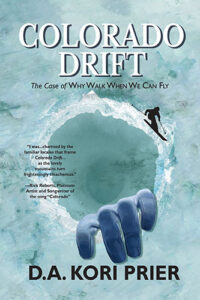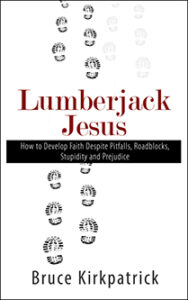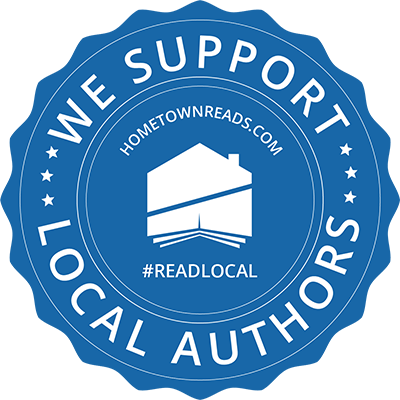Thank you to D.A. Kori Prier, author of Colorado Drift for writing this blog. In a conversation between two writers who are discussing Writer’s Block, one writer realizes how they have to change. One writer is a “plotter” (someone who outlines and organizes their manuscript before/during the writing process) and the other writer is a “pantser” (someone who writes by the seat of their pants). Both paths work, but sometimes, you need to change your process for a certain manuscript in order to get past a block.
Wow, so you’re a writer huh?
Yep.
I’m writing too, but I’m in a funk.
Yeah, why’s that?
I’m stuck. I’ve got Writer’s Block. So, you ever get blocked?
Nope.
Really, how do you keep from losing your train of thought?
I prepare.
What do you mean? How do you prepare?
Well, first I do a shovel full of research on my topic.
So, you research everything?
Not quite everything, but most of the story’s plot.
Then what do you do?
Well, I organize the research into an order that formulates into my plot.
Really?
Yep. Then I write an outline of the story with all the parts (research and ideas) flowing through my diagram. This way, I know where my story is going and what I have to write next. I can always adjust the outline if something doesn’t fit or if I come up with a brilliant idea.
And this works for you?
Yep.
Would it work for me, too?
Yep, but you have to be disciplined and do the research, organize your thoughts, and outline your plot.
It sounds like a lot of work.
It is, but it keeps my creative processes juiced and always flowing. Besides, how long have you had your Writer’s Block?
A couple of weeks now.
Well, in two weeks you could have done most or all of your research and developed an outline.
I see your point. I think I need to start doing a better job than just writing from the top of my head.
Good for you.
We all get stuck once in a while. Here are a few things you can try to help yourself get out of Writer’s Block.
- Get away from your story. Find a hobby and relax. Avoid thinking about your manuscript. As your body relaxes, your brain will, too, and it will naturally figure out the problem you are having with the plot—if that’s the reason you’re stuck and getting Writer’s Block.
- Set up a writing routine and do it every day, 6 days a week. Structure will help form positive habits that lead to positive creativity.
- Work on your research. A new idea could strike. Changing your process techniques could help the flow of ideas.
- Talk your problem out with a writing buddy or an editor. They may be helpful in getting you to the root of the problem.
- Go on vacation. Take a few days and do something you’ve never done before or go somewhere you’ve always wanted to go. Get away from the stresses of everyday life for a few days. This could help your creative process because you’ll be experiencing different emotions through your new experiences.
- Laugh. Spend some time with someone who makes you laugh. Laughter will help release tension.
- Pamper yourself: see a massage therapist, get a manicure or hair cut, or go to a spa. While you’re focused on yourself, your body will naturally relax and you’ll be able to figure out the problem.

D.A. Kori Prier was born and grew up in the two-mile high town of Leadville, Colorado. Now retired, he lives in Northern California with his wife, Snuz. Colorado Drift is the first book of a new series. Mr. Prier’s extensive knowledge of the mountainous geography lends credibility to the story and makes the adventure feel real and possible. Kori and Snuz enjoy traveling with their three four-legged girls: Becca, Tessa, and Bella.
Colorado Drift takes the reader on a snowy, modernistic science fiction adventure inside a Rocky Mountain avalanche.
If you found this article helpful, please share it with your friends who may find it useful. Thank you!


 I can’t quite go as far as to say that I am grateful I was diagnosed with breast cancer, but I can say that I am grateful for all of the realizations that have resulted because of it. I was given the opportunity to tap into a reservoir of courage I didn’t even know existed. I witnessed people at their best as they surrounded me with their clinical, surgical, and scientific expertise, genuine concern, humor, compassion, energy, and love. The word friendship took on a whole new meaning with each chemo sitter who took time out of her busy life to sit with me for hours on end. And I found out that my marriage was indeed for better or worse.
I can’t quite go as far as to say that I am grateful I was diagnosed with breast cancer, but I can say that I am grateful for all of the realizations that have resulted because of it. I was given the opportunity to tap into a reservoir of courage I didn’t even know existed. I witnessed people at their best as they surrounded me with their clinical, surgical, and scientific expertise, genuine concern, humor, compassion, energy, and love. The word friendship took on a whole new meaning with each chemo sitter who took time out of her busy life to sit with me for hours on end. And I found out that my marriage was indeed for better or worse.


